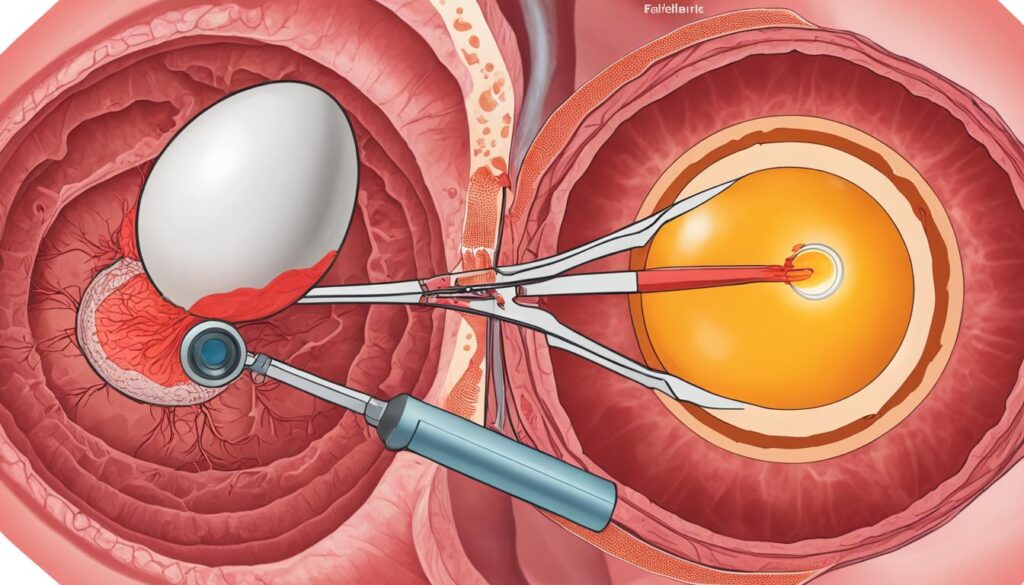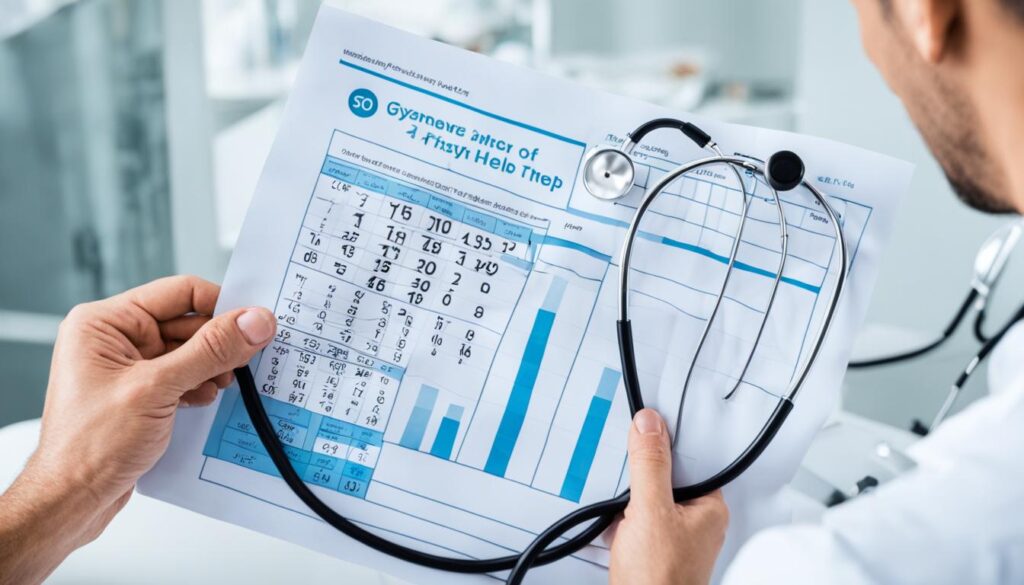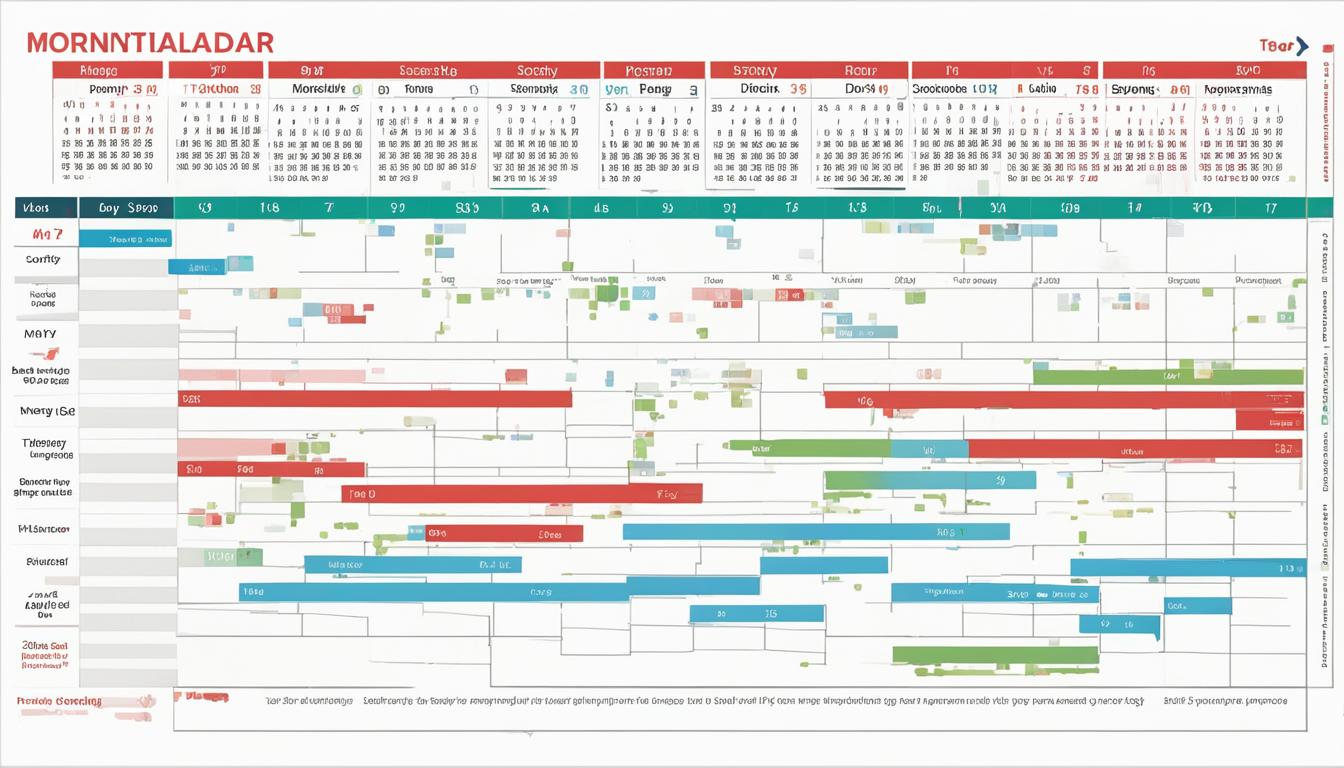Welcome to our comprehensive guide on understanding your monthly periods cycle. Menstruation is a natural process experienced by every woman of reproductive age, and it plays a crucial role in maintaining overall reproductive health. We’ve created this guide to help you better understand your menstrual cycle, manage symptoms, and maintain balance throughout your cycle.
Key Takeaways:
- Women of reproductive age experience a monthly menstrual cycle.
- The menstrual cycle involves phases of hormonal changes and physical symptoms.
- Managing symptoms and maintaining hormonal balance is crucial for reproductive health.
- Consulting a healthcare professional is recommended for irregularities and severe symptoms.
- Lifestyle changes and natural remedies can support overall menstrual health.
The Menstrual Phase
Welcome to the first phase of the monthly periods cycle, the menstrual phase. This phase typically lasts between three to seven days, during which the uterus sheds its lining, resulting in a monthly period flow. The average period flow is around 30-40 milliliters, or about 2-3 tablespoons, but can vary from person to person.
For most women, managing menstrual cramps is a common challenge during this phase. To find relief, try over-the-counter pain relievers, heating pads, or gentle exercises like yoga or Pilates. Additionally, certain foods like salmon, leafy greens, and dark chocolate can help combat inflammation and reduce cramps.
It’s essential to maintain proper hygiene during the menstrual phase and to regularly change your menstrual products to avoid infection. Choose the menstrual product that works best for your body and lifestyle, be it pads, tampons, menstrual cups, or period panties.
Tip: If you’re experiencing heavy or prolonged bleeding or intense pain that doesn’t subside with home remedies, consult with your healthcare provider to rule out any underlying health issues.
The Follicular Phase
The follicular phase is the second phase of the menstrual cycle, lasting about 14 days. During this phase, the follicles in the ovaries begin to mature and prepare for ovulation.
Hormone levels also change during this phase, with the follicle-stimulating hormone (FSH) and luteinizing hormone (LH) levels increasing to facilitate ovulation. The FSH stimulates the follicles to grow and produce estrogen, while the LH triggers the dominant follicle to release an egg.
The body is preparing for ovulation during the follicular phase, making it an important time for women who are trying to conceive. Keeping track of the menstrual cycle and monitoring bodily changes, like increased cervical mucus, can help with predicting ovulation.
It is important to note that the length of the follicular phase can vary from person to person and cycle to cycle. A healthy follicular phase can range from 11 to 27 days, with an average of 14 days.
Key Takeaways
- The follicular phase is the second phase of the menstrual cycle, lasting about 14 days.
- Follicles in the ovaries begin to mature and prepare for ovulation during this phase.
- Hormone levels, specifically FSH and LH, increase during the follicular phase to facilitate ovulation.
- The body is preparing for ovulation during this phase, making it an essential time for women trying to conceive.
- Keeping track of the menstrual cycle and monitoring bodily changes can help predict ovulation.
Ovulation Phase
As the name suggests, this phase marks the release of an egg from the ovary’s follicle. The duration of the ovulation phase is usually between 12 and 24 hours, and it is the most fertile window of the menstrual cycle. To achieve conception, sexual intercourse during this period is recommended.(ovulation, fertile window)
Tracking ovulation can be done by monitoring basal body temperature, cervical mucus changes, and using ovulation predictor kits. This knowledge can help pinpoint the fertile window and increase the chances of conception.(tracking ovulation)
It’s important to note that ovulation can be affected by numerous factors, such as stress, weight, and age. Therefore, it’s essential to maintain a healthy lifestyle to improve the chances of successful conception.(ovulation)

“Not all women ovulate on day 14 of their cycle – it’s important to monitor your body and learn the signs of ovulation for optimal chances of conceiving.” – Dr. Jane Doe
The Luteal Phase
During the luteal phase, progesterone levels rise and prepare the uterus for pregnancy. Progesterone is a hormone produced by the ovary’s corpus luteum after ovulation. This hormone helps in thickening the uterine lining, leading to implantation of a fertilized egg.
However, if pregnancy does not occur, progesterone levels drop, leading to the start of menstruation. As the luteal phase comes to an end, some individuals may experience premenstrual symptoms such as bloating, mood swings, and breast tenderness.
“The luteal phase is a critical stage in the menstrual cycle, affecting fertility and menstrual health. It’s essential to track and monitor this phase for a better understanding of your body’s reproductive system.”
Managing Monthly Period Symptoms
Monthly periods can bring a range of symptoms that negatively impact our daily lives. Luckily, there are several practical ways to manage common symptoms such as menstrual cramps and severe menstrual pain.
| Tip | Description |
|---|---|
| Exercise | Engage in regular exercises such as walking, jogging, or yoga to reduce stress, improve blood circulation, and manage menstrual pain. |
| Heat therapy | Use a heating pad or take a warm bath to ease pain and discomfort that occur during monthly periods. |
| Diet | Include anti-inflammatory foods such as leafy greens, fruits, and nuts in your diet to reduce inflammation and pain caused by menstruation. |
| Herbal remedies | Herbs like ginger, cinnamon, and chamomile have properties that can help relieve menstrual pain and cramps. |
If none of these remedies work, it’s essential to consult a professional. A gynecologist can help diagnose and treat severe menstrual pain or other monthly period symptoms that may affect your daily life.

Maintaining Hormonal Balance
Hormonal balance is a vital component of a healthy menstrual cycle. Menstrual cycle irregularities, such as frequent or missed periods, heavy or light bleeding, or severe cramps, may indicate an imbalance in hormones. To promote hormonal equilibrium and maintain a healthy menstrual cycle, consider the following strategies:
- Manage stress: High levels of stress can disrupt hormonal balance. Try relaxation techniques such as deep breathing, meditation, or yoga to help manage stress.
- Exercise regularly: Engaging in regular physical activity not only helps reduce stress but also promotes hormonal balance.
- Get enough sleep: Poor sleep can affect the levels of hormones that regulate the menstrual cycle. Aim for seven to eight hours of quality sleep each night.
- Eat a well-balanced diet: A healthy diet rich in fruits, vegetables, lean protein, and whole grains can help support hormonal balance.
- Consider natural remedies: Some herbs and supplements, such as evening primrose oil or chasteberry, may help regulate hormones and alleviate menstrual cycle irregularities.
Making lifestyle changes, such as managing stress, exercising regularly, and getting adequate sleep, can significantly impact hormonal balance and promote a healthy menstrual cycle. However, if you experience persistent or severe menstrual cycle irregularities, consult your gynecologist for professional help.
Lifestyle and Nutrition Tips
Maintaining a healthy lifestyle is crucial for managing monthly periods. Exercise is a great way to alleviate menstrual cramps and boost mood. Even light exercise, such as brisk walking or yoga, can make a big difference. Additionally, stress management techniques such as meditation or deep breathing can help reduce anxiety and promote relaxation.
Nutrition also plays a significant role in menstrual health. Eating a balanced diet rich in whole foods, protein, and healthy fats can help regulate hormones and reduce inflammation. Incorporating iron-rich foods such as leafy greens and red meat can also help combat fatigue and prevent anemia.

Healthy Period Diet Recommendations
| Food Group | Recommendations |
|---|---|
| Whole Grains | Quinoa, brown rice, whole wheat bread or pasta |
| Protein | Chicken, turkey, lean beef, tofu, beans, nuts |
| Fruits and Vegetables | Dark leafy greens, berries, citrus fruits, carrots, sweet potatoes |
| Healthy Fats | Nuts, seeds, avocado, olive oil, coconut oil |
Remember, a healthy lifestyle doesn’t need to be complicated or restrictive. Small changes like choosing whole foods over processed foods or taking a daily walk can make a big difference in managing monthly period symptoms.
By implementing these lifestyle and nutrition tips, you can support a healthy menstrual cycle and reduce the severity of monthly period symptoms. However, it’s important to note that if you experience severe symptoms or irregularities, it’s always best to consult with a gynecologist for professional advice.
Seeking Professional Help
While most menstrual cycle abnormalities are mild and go away on their own, in some cases, seeking professional help is necessary. Women experiencing severe symptoms that disrupt their daily lives or those who have irregular periods should consider consulting a gynecologist. A gynecologist is a medical professional who specializes in female reproductive health and can provide professional help and guidance tailored to each individual’s needs.
During a visit to a gynecologist, a woman’s medical history will be evaluated, and a physical examination will be performed. The gynecologist may also order additional tests such as blood work or an ultrasound to identify any menstrual cycle abnormalities or underlying health concerns. Based on the evaluation, the gynecologist will recommend suitable treatment options, which may include medication, hormonal therapy, or lifestyle changes. Don’t take menstrual cycle abnormalities lightly, seek professional help to ensure long-term menstrual health.

Gynecologist
A gynecologist is a medical professional who specializes in female reproductive health. They are trained to diagnose and treat various menstrual cycle abnormalities, such as irregular periods, heavy bleeding, and severe menstrual pain. They can also provide guidance on birth control, fertility, and menopause.
When to consult a Gynecologist
Women should consult a gynecologist if they experience any of the following:
- Severe menstrual pain
- Heavy bleeding
- Irregular periods
- Bleeding between periods
- Menstrual cycle abnormalities for more than three months
What to expect during a visit
During a visit to a gynecologist, women can expect:
- A medical history evaluation
- A physical examination, including a breast and pelvic exam
- Pap smear or HPV test, if necessary
- Addition tests, such as blood work or an ultrasound, if necessary
- Discussion of any menstrual cycle abnormalities and suitable treatment options
Remember, seeking professional help is critical for maintaining good menstrual health.
Natural Remedies for Monthly Periods
While over-the-counter pain relievers can help manage menstrual pain, natural remedies can offer an alternative approach. Here are some natural options to consider:
Herbal Supplements
Herbal supplements such as ginger, turmeric, and chamomile are known for their anti-inflammatory properties. Taking these supplements regularly may help reduce menstrual pain and inflammation.
Essential Oils
Applying essential oils such as lavender, clary sage, and peppermint to the abdominal area may help relax muscles and ease menstrual cramps. Mix a few drops of the essential oil with a carrier oil and massage into the skin for relief.
Acupuncture
Acupuncture involves the insertion of thin needles into specific points on the body to promote healing and balance. It has been shown to be effective in reducing menstrual pain and other symptoms associated with the menstrual cycle.
Heat Therapy
Applying heat to the abdominal area can help relax muscles and alleviate menstrual cramps. Use a heating pad or take a warm bath to ease discomfort.
Dietary Changes
Incorporating foods rich in magnesium, such as leafy greens, nuts, and whole grains, may help reduce menstrual pain and other symptoms. Additionally, avoiding caffeine, alcohol, and processed foods may also alleviate symptoms.
By incorporating natural remedies into a menstrual pain relief routine, women can manage symptoms and promote overall well-being. As with any treatment, it is important to consult a healthcare provider before trying a new approach.
Conclusion
Understanding your monthly periods cycle is crucial for maintaining good menstrual health. From managing symptoms to maintaining balance, every phase of the menstrual cycle plays an essential role. It is essential to stay informed about the length, phases, hormonal changes, and other aspects of your menstrual cycle.
Effective symptom management strategies such as lifestyle changes, dietary suggestions, alternative remedies, and seeking professional help can help you maintain balance throughout the menstrual cycle. It is also important to maintain hormonal balance by following healthy lifestyle practices and seeking professional help when necessary.
In conclusion, taking care of your menstrual health is essential for overall health and well-being. By following the tips and strategies discussed in this article, you can promote a healthy and balanced menstrual cycle. Remember to prioritize symptom management, maintain balance throughout the menstrual cycle, and seek professional help when necessary.
FAQ
What is the menstrual cycle?
The menstrual cycle is a monthly process in which the uterus prepares for pregnancy. It typically lasts about 28 days and involves hormonal changes that result in the shedding of the uterine lining, known as menstruation.
How long does the menstrual phase last?
The menstrual phase, also known as the period, usually lasts about 3 to 7 days. During this phase, the uterus sheds its lining, leading to vaginal bleeding.
What are some tips for managing menstrual cramps?
To manage menstrual cramps, try applying heat to the lower abdomen, taking over-the-counter pain relievers, practicing relaxation techniques like deep breathing or yoga, and engaging in light exercise such as walking.
What happens during the follicular phase?
The follicular phase is the phase before ovulation. During this phase, the ovaries produce follicles that contain eggs. The levels of estrogen gradually increase, preparing the uterus for potential pregnancy.
How can I track ovulation?
You can track ovulation by using methods such as tracking basal body temperature, monitoring changes in cervical mucus, using ovulation predictor kits, keeping track of menstrual cycle length, or using fertility tracking apps.
What are premenstrual symptoms, and how can they be managed?
Premenstrual symptoms are physical and emotional changes that occur before menstruation. You can manage them by getting regular exercise, getting enough sleep, eating a balanced diet, reducing stress, and trying relaxation techniques.
How can I manage severe menstrual pain?
Severe menstrual pain can be managed by taking pain relievers like ibuprofen, using heating pads or hot water bottles on the lower abdomen, practicing relaxation techniques, and trying gentle exercises like yoga or stretching.
What are some strategies for maintaining hormonal balance?
Strategies for maintaining hormonal balance include getting regular exercise, managing stress levels, avoiding excessive caffeine and alcohol consumption, getting enough sleep, and maintaining a healthy diet rich in fruits, vegetables, and whole grains.
What lifestyle tips can help maintain healthy periods?
To maintain healthy periods, it’s important to exercise regularly, manage stress levels, maintain a healthy weight, eat a balanced diet, avoid smoking, limit caffeine and alcohol intake, and get enough sleep.
When should I seek professional help for menstrual cycle abnormalities?
You should seek professional help for menstrual cycle abnormalities if you experience extremely heavy or prolonged periods, severe pain, irregular cycles, or other concerning symptoms that significantly impact your quality of life.
Are there natural remedies for menstrual pain relief?
Yes, there are natural remedies for menstrual pain relief. Some options include using herbal supplements like ginger or turmeric, applying essential oils topically, practicing acupuncture, trying yoga or meditation, and using heat therapy.

Phenomenal, great job
linetogel
nice content!nice history!! boba 😀
linetogel
linetogel
wow, amazing
Stellar, keep it up
wow, amazing
nice content!nice history!! boba 😀
wow, amazing
wow, amazing